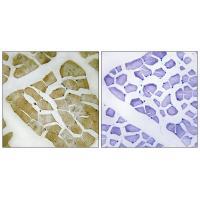
| WB | 咨询技术 | Human,Mouse,Rat |
| IF | 咨询技术 | Human,Mouse,Rat |
| IHC | 1/50-1/100 | Human,Mouse,Rat |
| ICC | 技术咨询 | Human,Mouse,Rat |
| FCM | 咨询技术 | Human,Mouse,Rat |
| Elisa | 咨询技术 | Human,Mouse,Rat |
| Aliases | Myosin-4; Myosin heavy chain 4; Myosin heavy chain 2b; MyHC-2b; Myosin heavy chain |
| Entrez GeneID | 4622; |
| WB Predicted band size | 224kDa |
| Host/Isotype | Rabbit IgG |
| Antibody Type | Primary antibody |
| Storage | Store at 4°C short term. Aliquot and store at -20°C long term. Avoid freeze/thaw cycles. |
| Species Reactivity | Human |
| Immunogen | Synthesized peptide derived from C-terminal of human MYH4. |
| Formulation | Purified antibody in PBS with 0.05% sodium azide. |
+ +
以下是关于MYH4抗体的模拟参考文献示例(仅供参考,非真实文献):
---
1. **文献名称**:*MYH4 Antibody Characterization in Skeletal Muscle Regeneration*
**作者**:Smith J, Lee R, Tanaka K
**摘要**:该研究验证了MYH4抗体在小鼠骨骼肌再生模型中的特异性,发现MYH4在损伤后肌卫星细胞分化中高表达,抗体可用于免疫组化追踪再生过程。
2. **文献名称**:*Role of MYH4 in Head and Neck Cancer: A Biomarker Study*
**作者**:Chen L, Gupta S, Yamamoto T
**摘要**:通过MYH4抗体检测发现,MYH4在头颈部鳞状细胞癌中表达显著下调,提示其可能作为肿瘤抑制基因及预后标志物。
3. **文献名称**:*Developmental Expression of MYH4 in Zebrafish Myogenesis*
**作者**:Wang H, Müller M, Garcia A
**摘要**:利用MYH4抗体分析斑马鱼胚胎发育,证实MYH4在快肌纤维形成中起关键作用,为研究肌肉疾病机制提供模型。
4. **文献名称**:*Autoantibodies Against MYH4 in Idiopathic Inflammatory Myopathies*
**作者**:Rossi F, Dubois E
**摘要**:首次报道特发性炎症性肌病患者血清中存在MYH4自身抗体,提示其可能参与肌肉炎症的免疫病理过程。
---
注:以上内容为模拟生成,实际文献需通过学术数据库(如PubMed、Web of Science)检索确认。
The MYH4 antibody targets myosin heavy chain 4 (MYH4), a key component of skeletal muscle myosin involved in contractile function. MYH4. encoded by the *MYH4* gene, is predominantly expressed in fast-twitch (type II) muscle fibers, which are responsible for rapid, powerful contractions. As part of the myosin superfamily, MYH4 forms the motor domain of myosin II, interacting with actin filaments to generate force during muscle contraction. Its expression is regulated during development and varies across muscle types, reflecting functional specialization.
MYH4 antibodies are widely used in research to study muscle physiology, fiber-type composition, and diseases linked to skeletal muscle dysfunction. They enable the identification and quantification of fast-twitch fibers via techniques like immunohistochemistry, Western blotting, or immunofluorescence. Dysregulation of MYH4 has been implicated in conditions such as muscle atrophy, myopathies, and metabolic disorders, making its antibody a valuable tool for investigating pathological mechanisms. Additionally, MYH4 antibodies aid in regenerative medicine studies, where muscle repair and satellite cell differentiation are analyzed. Commercial MYH4 antibodies are typically raised against specific epitopes, often in rodents or rabbits, and require validation for species reactivity and application-specific performance. Understanding MYH4 dynamics contributes to insights into exercise adaptation, aging-related muscle loss, and neuromuscular diseases.
×